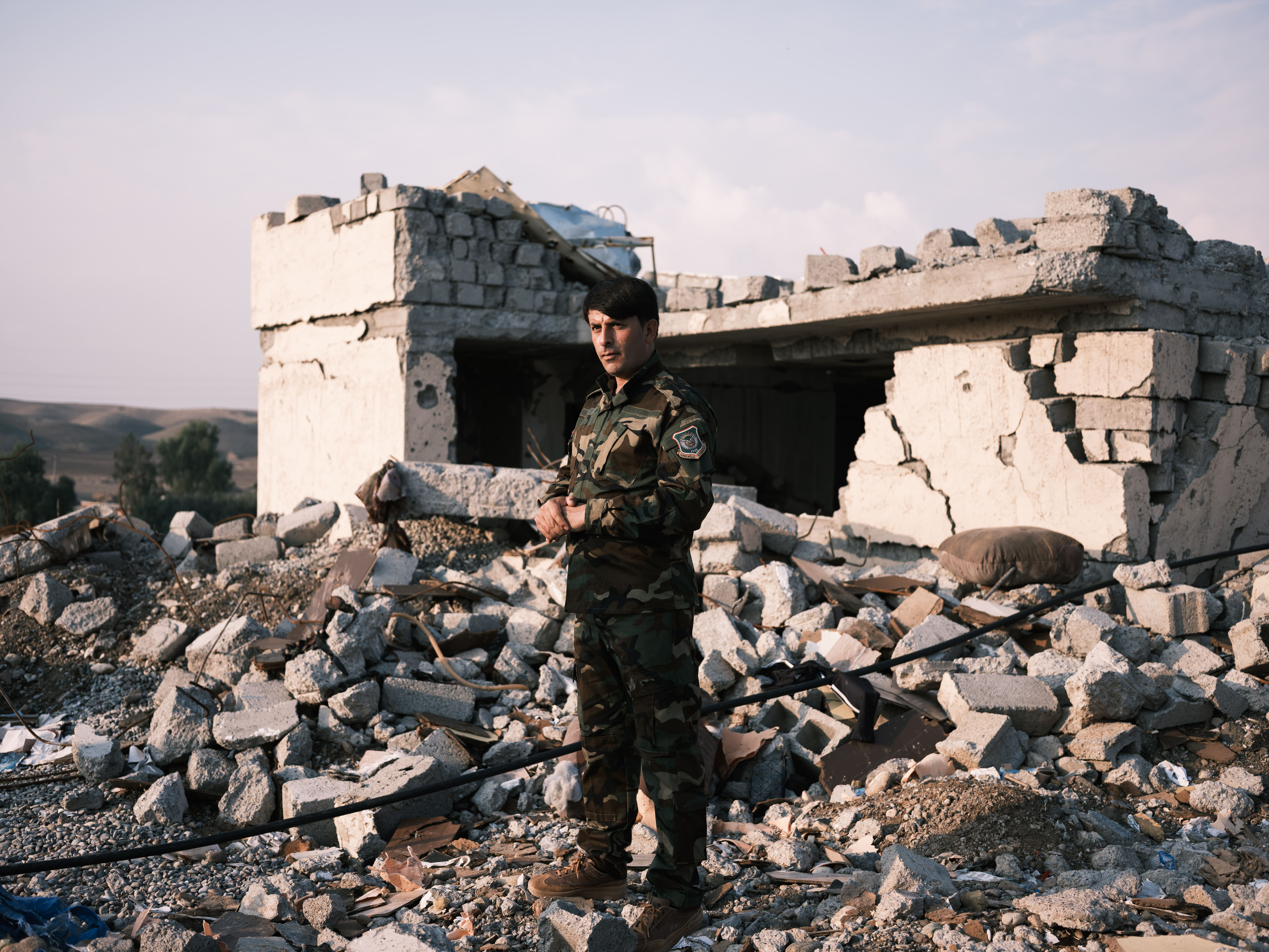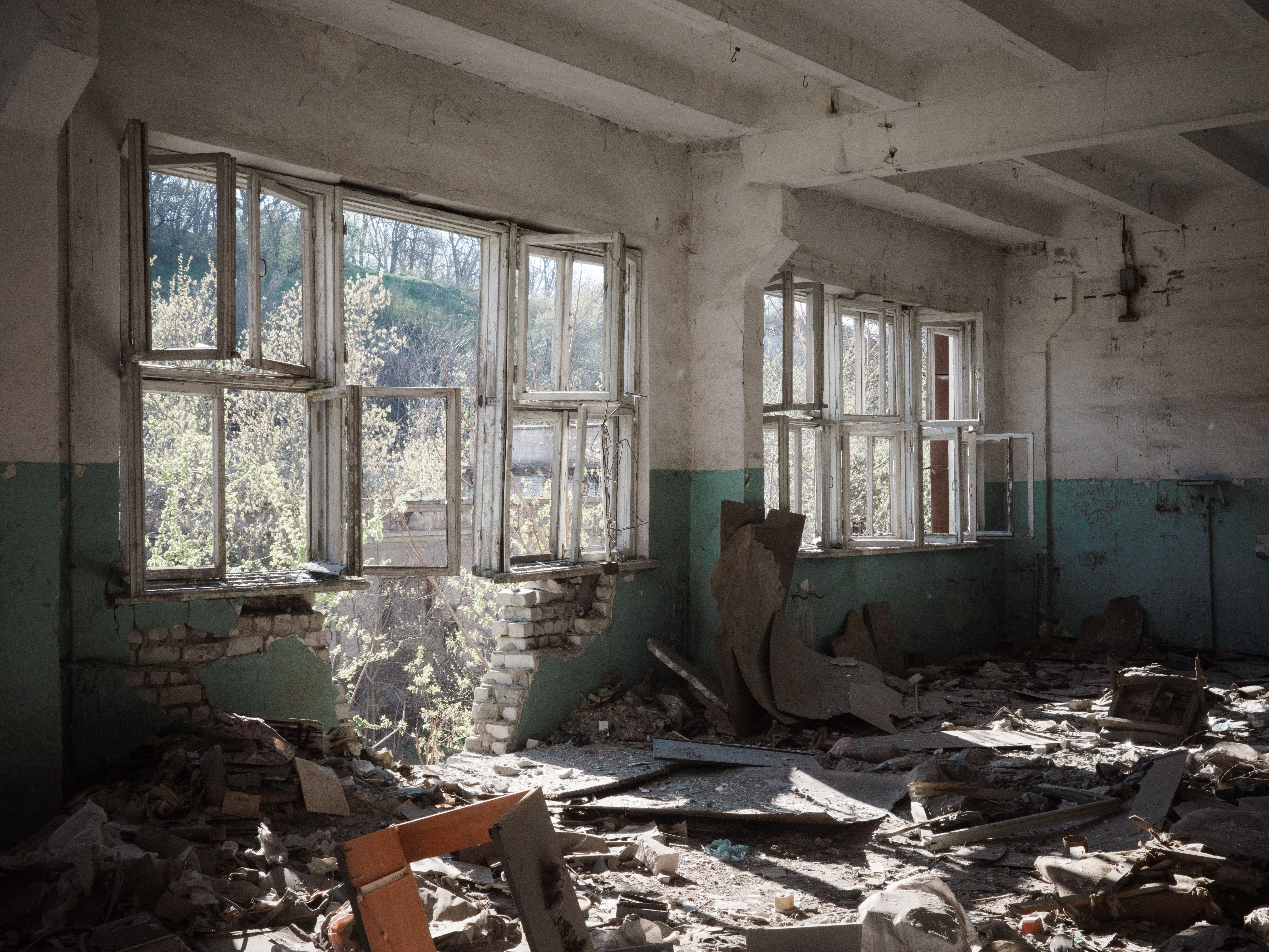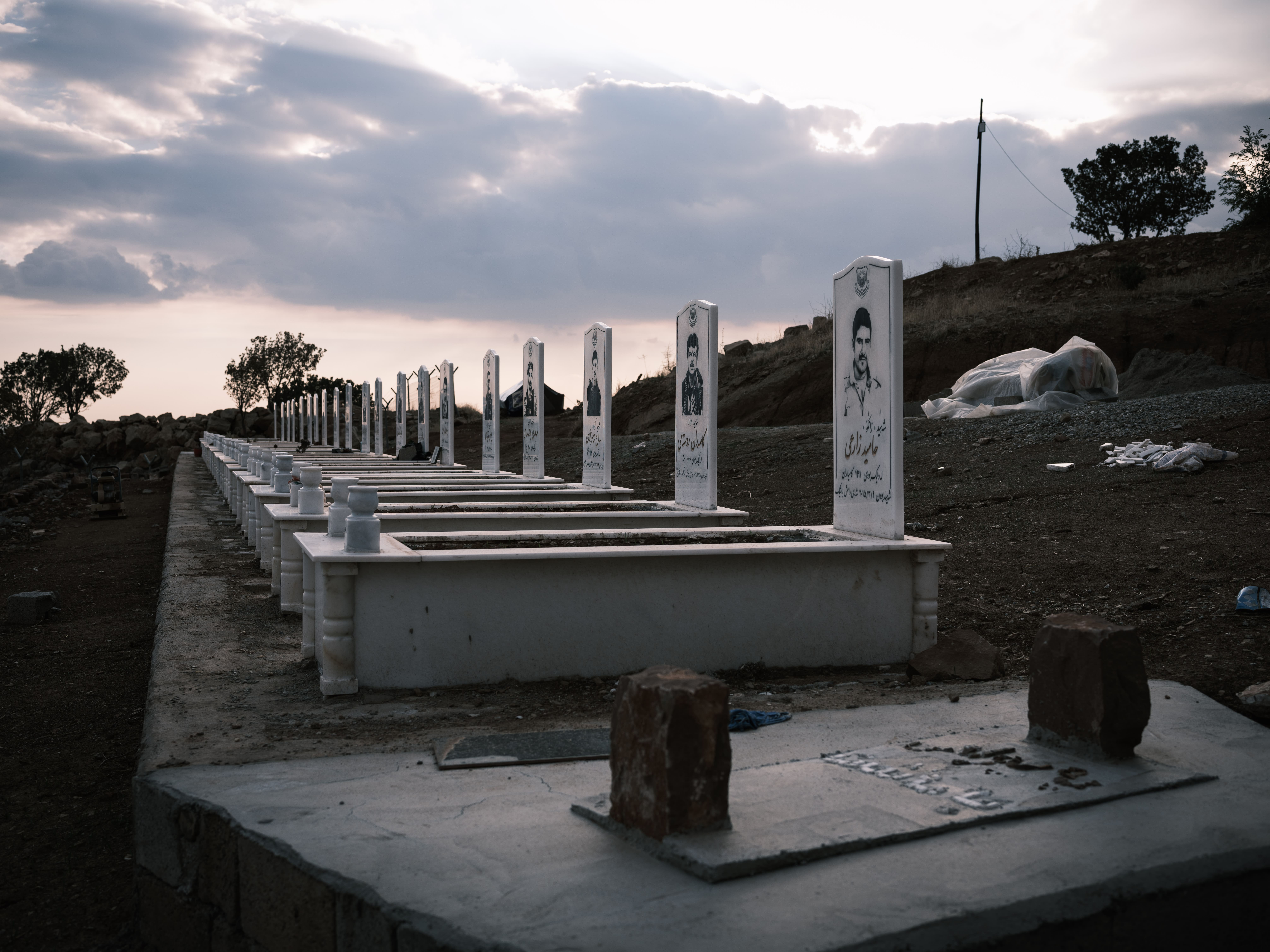Empires’ Wings

How should we understand “anti-imperialism” today? What questions do dual-use technologies, such as drones, pose for struggles against oppression? Photojournalist and researcher Caspar Ermert draws on his fieldwork in Ukraine and Kurdistan to explore struggles for self-determination in these regions
In April, I returned from Kryvyj Rih, an industrial city in Ukraine, to Odesa, a beautiful but embattled port city on the Black Sea. I was on my way to meet friends from the “Street Aid Daily” collective, a group of young activists who support people experiencing homelessness. While scrolling through the news on the train that night, I read that Odesa had come under drone attack once again. Due to the city’s strategic significance and the fact that it hosts the last major Ukrainian-controlled port, it is frequently targeted by the Russian army.
Early the next morning, after the curfew was lifted, I joined the collective near the main train station, where they were distributing tea, hygiene supplies, medical support, and clothes. Later, we visited a squat run by the Ecoplatform Collective, a group that approaches ecology through an anarchist lens. A Shahed drone, also known as the Geran-2 in Russia, had just hit that very building. Fortunately, no one in the room was hurt. But others — recovering soldiers, artists, and activists — had been sleeping below. Many of the workshops housed in the building were severely damaged.
As we helped clear the shattered glass and debris, the work became almost meditative. It reminded me of a similar scene in the mountains of Başûr, the territory of South Kurdistan and Northern Iraq, in December 2022, when I witnessed the aftermath of Iranian Shahed drone strikes targeting Kurdish opposition groups in exile in the region. Tehran blamed these groups for sparking the recent uprising and for influencing the “Jin, Jiyan, Azadî” [author’s note: translated to English as “Women, Life, Freedom”] movement in Rojhelat, the territory of Eastern Kurdistan and Western Iran.


Though the victims in Ukraine and Kurdistan were different, these attacks share two unsettling elements: a parallel struggle for self-determination and the deliberate use of drones to undermine it. These experiences — one in the post-Soviet ruins of Ukraine and the other in the fractured landscapes of Kurdistan — reveal a disturbing continuity.
I will highlight how authoritarian states employ shared technologies, such as the Shahed drone, to enforce new forms of imperial domination, often masked by anti-imperialist rhetoric. Furthermore, I will demonstrate how drones, such as Turkey’s Bayraktar TB2, serve dual roles as symbols of resistance in some places and tools of repression in others. This reveals the contradictions of today's imperialism in a multipolar world.
Shahed Drones: from Kurdistan to Ukraine
Developed over decades under the strain of Western sanctions, Iran’s drone program gained global attention in 2019 after strikes on Saudi oil facilities. However, it was only after Russia’s full-scale invasion of Ukraine in 2022 that the Shahed drone gained global notoriety.
Facing mounting battlefield losses and dwindling weapons stockpiles, Russia, driven by its shared opposition to U.S. and Western hegemony, turned to Iran in search of affordable and effective weaponry. As a result, Iran started selling Shahed drones, and soon after, it started sharing the technology needed to produce them, which enabled Russia to manufacture drones domestically under the name Geran-2. Integrated swiftly into Russia’s war machine, these drones enabled and continue to enable cost-effective saturation strikes, which are particularly aimed at civilian infrastructure, energy networks, and urban centers throughout Ukraine.
While these drones had already undergone “real-world testing,” most notably in Ukraine, they were simultaneously deployed in Kurdistan. There, Iran used them to attack opposition groups exiled in Northern Iraq, killing at least 20 people in two separate instances in September and November of 2022. These parallel assaults provided both Iran and Russia with a live testing ground to refine their drone warfare, allowing them to improve their tactics with real-time battlefield feedback.
The “Anti-Western Axis” and its Contradictions
The partnership between Iran and Russia, which underlies these assaults and exchanges, is often framed as part of a rising “Anti-Western Axis,” a loose alliance of states opposed to the U.S. and NATO hegemony, whose rhetoric is wrapped in the language of anti-imperialism. Supporters of this bloc frequently point to legitimate grievances, such as the “shock therapy” and austerity measures that the U.S. supported in post-Soviet Russia and the tough sanctions imposed on Iran, which have deepened civilian suffering and fostered authoritarian populism. Within this narrative, these regimes portray themselves as liberators, defenders of sovereignty, and champions of the oppressed.
Yet their actions tell a very different story. This so-called axis does not liberate the oppressed; it represses them. From bombing Kurdish opposition groups in Iraq to leveling Ukrainian cities, from violently suppressing protests in Iran to persecuting dissent in Russia and Belarus, these regimes systematically trample on the very right to self-determination they claim to uphold. Their anti-imperialist rhetoric does not lead to emancipation; instead, it serves as a veil for authoritarian control. In this context, cooperation around drone technology is not about resisting the empire. It is about building their own. Authoritarian internationalism is not internationalism. Anti-Westernism is not the same as anti-imperialism.
The growing popularity of multipolar narratives, particularly among some people on the global left, has led to a dangerous moral confusion: the idea that any opposition to Western power should be supported. But what if those opposing the West are imperial powers themselves? What happens when supposed allies in the struggle against imperialism are actually just other perpetrators of it?
In this landscape, multipolarity has not brought emancipation. Rather, it has deepened fragmentation and multiplied centers of domination. The battlegrounds of Kurdistan and Ukraine are littered with the remains of clashing empires, both old and new. Against this background, it is precisely progressive movements — socialist, feminist, ecological, labor-based, and anti-authoritarian — that are caught in the crossfire. Their struggles for justice and self-determination are buried beneath bombs and reduced to pawns in the recomposition of empires. Rhetorics of resistance are weaponized to justify repression. “Anti-Western” is too often mistaken for “liberatory,” and in that confusion, the voices of the truly oppressed are silenced.


The Bayraktar Paradox
Nowhere is the contradiction of drone warfare more apparent than in the story of Turkey’s Bayraktar TB2 drones.
Produced by Baykar, a company run by President Erdoğan’s son-in-law, Selçuk Bayraktar, these drones were widely praised in the early stages of Russia’s full-scale invasion of Ukraine. They destroyed tanks, stalled military advances, and reportedly contributed to the sinking of the Moskva, Russia’s Black Sea flagship. TB2 drones quickly became a symbol of resistance, inspiring songs and memes that went viral.
But beneath this symbolism lies a deeper dynamic of dependency. Just as Ukraine’s recent mineral-for-debt relief agreement with the United States illustrates how war financing can be linked to the extraction and sale of national resources, reliance on Turkish military exports could lead to similar forms of subordination. This extends beyond weapons: Turkey’s growing geopolitical reach, which some refer to as “drone diplomacy,” has far-reaching consequences.
For example, reports suggest that Ukrainian forces trained Syrian rebel groups in FPV drone operations on Turkish soil. Some of those fighters later participated in the overthrow of the Assad regime and were implicated in committing atrocities against Alawite and Druze minorities. These connections expose the darker side of strategic military cooperation: alliances forged under the banner of resistance can perpetuate cycles of violence and further the imperial agendas of authoritarian actors, such as Turkey.
This contradiction is especially stark in Kurdistan, where the same Bayraktar drones that were celebrated in Ukraine are now instruments of repression. Following Turkey’s occupations of Afrin and Serêkaniyê in 2018 and 2019, respectively, the drones became central to a sustained shadow war against the Democratic Autonomous Administration of North and East Syria (DAANES), also known as Rojava. This grassroots political project, rooted in Abdullah Öcalan’s vision of “Democratic Confederalism” — which emphasizes local autonomy, gender equality, and direct democracy — has been systematically targeted through drone-enabled assassinations and attacks on important infrastructure.
What began as a radical experiment in self-governance during the Syrian civil war is now relentlessly undermined by Turkish drone warfare. Leaders of the women’s movement, council members, and civil society organizers have been assassinated as part of a broader campaign to dismantle Rojava’s institutions and extinguish its alternative vision for the region — the vision that directly challenges Turkey’s nationalist and centralized state model.
This threat is compounded by a troubling feedback loop: the same Syrian rebel factions that were trained by Ukrainian forces and are already implicated in violence against minority communities may, in the future, be deployed against DAANES territories. In this scenario, Turkey’s “drone diplomacy” not only facilitates repression but also enables NATO-aligned military expertise to be weaponized against one of the region’s most progressive political experiments.
.jpg)
.jpg)
This can be understood as the Bayraktar paradox: a drone that is praised for defending Ukraine’s sovereignty and self-determination is also used to destroy both of those things in Kurdistan. Turkey’s dual role reflects its broader imperial ambitions, shaped by neo-Ottoman aspirations in a multipolar world. At the heart of this strategy is Turkey’s growing defense industry, where drones serve not only as instruments of war but also as tools of geopolitical leverage, embodying the logic of flexible imperialism in the age of drone warfare.
Anti-Imperialism from Below: Refusing All Empires
In both Ukraine and Kurdistan, the contradictions of drone warfare reveal the brutality of modern conflict, as well as the intertwining of repression, resistance, and geopolitical opportunism in an ever-changing imperial landscape. From Iran’s Shahed to Turkey’s Bayraktar, these technologies are far from neutral; they are shaped by the strategic interests of the states that wield them and the political economies that sustain their use. Whether framed as anti-imperialist tools or celebrated as instruments of liberation, drones often do nothing but extend authoritarian control, crush self-determination movements, and entrench new forms of dependency.
Nevertheless, resistance to these interlocking imperialisms persists. In Ukraine, people are engaged in a dual struggle: fending off brutal Russian aggression and navigating the return of austerity, conditional aid, and neoliberal restructuring, which has been accelerated by war financing and postwar reconstruction deals.
In Kurdistan, communities resist Turkish and Iranian military aggression while enduring structural violence in the form of isolation, occupation, and selective humanitarian support. Repression here comes not only in the form of bombs, but also through dependence on international NGOs, fragmented aid infrastructures, and the fluctuating interests of Western powers. The U.S. abandonment of its Kurdish allies in 2019, which paved the way for Turkey’s invasion of parts of Rojava, remains a sobering example.
Yet, across these regions, people are not merely victims of imperial rivalry. They are protagonists of resistance, confronting invading armies and the global hierarchies that render their lives expendable. Their politics does not speak the language of NATO, Moscow, Tehran, or Ankara. Instead, it is rooted in autonomy, mutual aid, and solidarity from below. They remind us that true anti-imperialism is not about choosing a “lesser” empire but about standing firmly with the oppressed in their fight for liberation.


International solidarity must reject the false choices presented by multipolarity. Anti-Westernism is not synonymous with anti-imperialism, and new empires can be just as violent and repressive as the old ones. True anti-imperialism begins with listening to the voices of the people impacted by imperial violence, who risk everything in the fight for dignity and self-determination across the world, from the mountains and streets of Kurdistan to the cities and trenches of Ukraine. Real anti-imperialism from below means refusing to take sides, supporting the anti-imperialist patriotism of the oppressed, and advancing an internationalist, class-conscious resistance to all imperialist blocs.
The lives and legacies of such people as Irish-born activist Finbar Cafferkey and Russian-born anarcho-communist Dmitry Petrov (“Ilya Leshiy”), who fought alongside Kurdish and Ukrainian comrades and organized resistance within the heart of Russian imperialism by founding the Combat Organization of Anarcho-Communists (BOAK), remind us that solidarity must not be defined by an allegiance to states, but by an unwavering commitment to the struggles of the oppressed, no matter which empire they face. Their actions exemplify what it means to resist imperialism in both theory and practice, with clear political independence and revolutionary intent.
As Petrov himself insisted, remaining neutral during a conflict means isolating oneself from the actual social process. Not intervening implies surrendering in the struggle for social liberation. Even when cooperating tactically with state structures, revolutionaries like him must retain their autonomy, pursue their own agenda, and continue promoting their political message. Their goal is not to serve states, but rather to empower the people and build emancipatory alternatives from below.
In an era of drone warfare and shifting global powers, this type of internationalism — rooted in mutual aid, lived solidarity, and a refusal to take sides among empires — is more vital than ever. It is embodied by the Kurdish freedom movement and progressive forces in Ukraine, such as Ecoplatform, Street Aid Daily, Direct Action, the Resistance Committee, Sotsialnyi Rukh, Solidarity Collectives, and independent unions. Forged in the fire of oppression, these movements carry the hopes of liberation from below. Those living in other countries must stand with them, because the only real resistance is one that refuses all empires — and builds power from below.

Мы намерены продолжать работу, но без вас нам не справиться
Ваша поддержка — это поддержка голосов против преступной войны, развязанной Россией в Украине. Это солидарность с теми, чей труд и политическая судьба нуждаются в огласке, а деятельность — в соратниках. Это выбор социальной и демократической альтернативы поверх государственных границ. И конечно, это помощь конкретным людям, которые работают над нашими материалами и нашей платформой.
Поддерживать нас не опасно. Мы следим за тем, как меняются практики передачи данных и законы, регулирующие финансовые операции. Мы полагаемся на легальные способы, которыми пользуются наши товарищи и коллеги по всему миру, включая Россию, Украину и республику Беларусь.
Мы рассчитываем на вашу поддержку!

To continue our work, we need your help!
Supporting Posle means supporting the voices against the criminal war unleashed by Russia in Ukraine. It is a way to express solidarity with people struggling against censorship, political repression, and social injustice. These activists, journalists, and writers, all those who oppose the criminal Putin’s regime, need new comrades in arms. Supporting us means opting for a social and democratic alternative beyond state borders. Naturally, it also means helping us prepare materials and maintain our online platform.
Donating to Posle is safe. We monitor changes in data transfer practices and Russian financial regulations. We use the same legal methods to transfer money as our comrades and colleagues worldwide, including Russia, Ukraine and Belarus.
We count on your support!
SUBSCRIBE
TO POSLE
Get our content first, stay in touch in case we are blocked

Еженедельная рассылка "После"
Получайте наши материалы первыми, оставайтесь на связи на случай блокировки














.svg)

